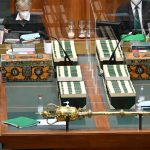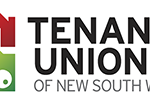Mike Baird: The value of authenticity
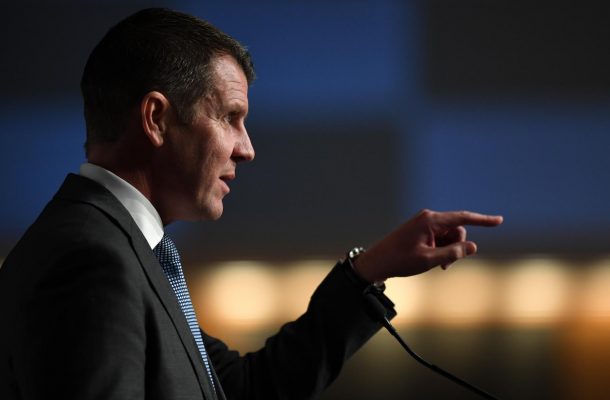
Mike Baird has an easy, laid-back manner about him. His shirt and tie are buttoned but somehow it feels like they should be loose. And he has a relaxed way of talking – an easy drawl to it.
Early in his political career there was no shortage of people telling the banker-turned-politician he needed to get voice coaching, including a former NSW premier. He never did.
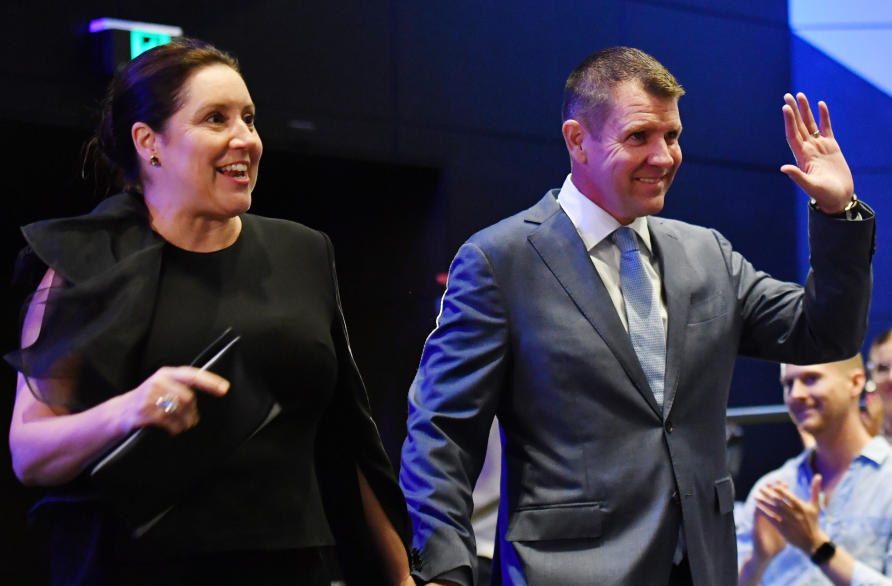
Mike Baird and wife Kerryn arrive at the NSW Liberal campaign launch at Penrith Panthers Leagues Club last year.
“Maybe that was probably important advice, but I wanted to communicate as me.
I didn’t want to put on an accent or something that wasn’t me. Someone even told me to stop wearing grey suits.”
For Baird — who would go on to win an election as NSW Premier himself, serving from 2014 to 2017 — one of the great challenges of political leadership is to be yourself. It is only by being authentic, he says, that you can hope to have people listen to you and be able to lead policy change.
The catch is that people won’t always be liking who you are.
“You have to put aside all that stuff that tells you how you should be and just be yourself — be what you believe in and what you are passionate about,” says Baird, who after leaving politics returned to banking and is now on the senior executive team at National Australia Bank.
“People will form their own views of you on that basis and will have much more respect for you, even if they may not like certain elements of that.”
Baird certainly was himself as NSW Premier, being prepared to wear his heart on his sleeve and taking both the good and the bad that came with it.
He bucked his own Liberal Party’s tough stance on refugees to advocate for taking in people from war-torn Syria, and his authenticity helped him to be a unifying figure in the wake of the 2014 Lindt Café terror siege in Sydney.
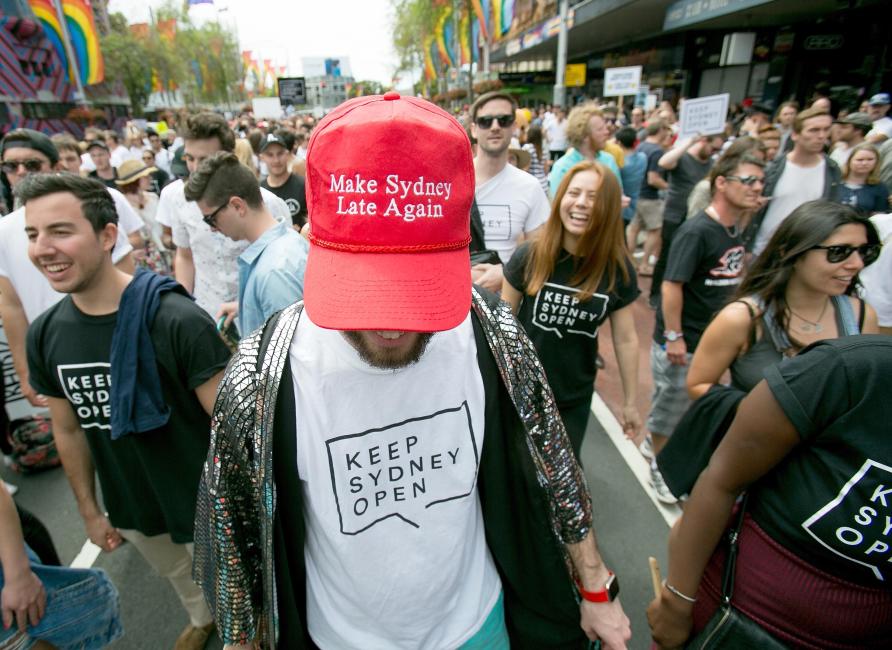
Lockout laws sparked widespread protests — here a man wears a hat saying “Make Sydney Late Again”, a reworking of Donald Trump’s campaign slogan, “Make America Great Again” at a Keep Sydney Open Protest in 2016.
He was an unapologetic supporter of the NSW Government’s controversial lockout laws that banned the late-night serving of alcohol in central Sydney’s busy bar areas to tackle alcohol-fuelled violence after two fatal incidents, and he reacted instinctively to revelations of cruelty in greyhound racing by announcing plans to ban it, only to invite criticism when he gave the industry a second chance.
“Any leader has to maintain authenticity, you need to do what you believe in. But sometimes there will be issues or policies where you have to recalibrate because it becomes clear there are additional facts and perspectives that haven’t been considered but are now clear, and you need to respond accordingly,” he says.
On the lockout laws in particular, Baird, as Treasurer in the Barry O’Farrell Government, remembers meeting the families of the two young men killed in the separate incidents that spurred the government to enact the laws. “It was a terrible situation, there had been needless loss of life — it was real and personal for people.”
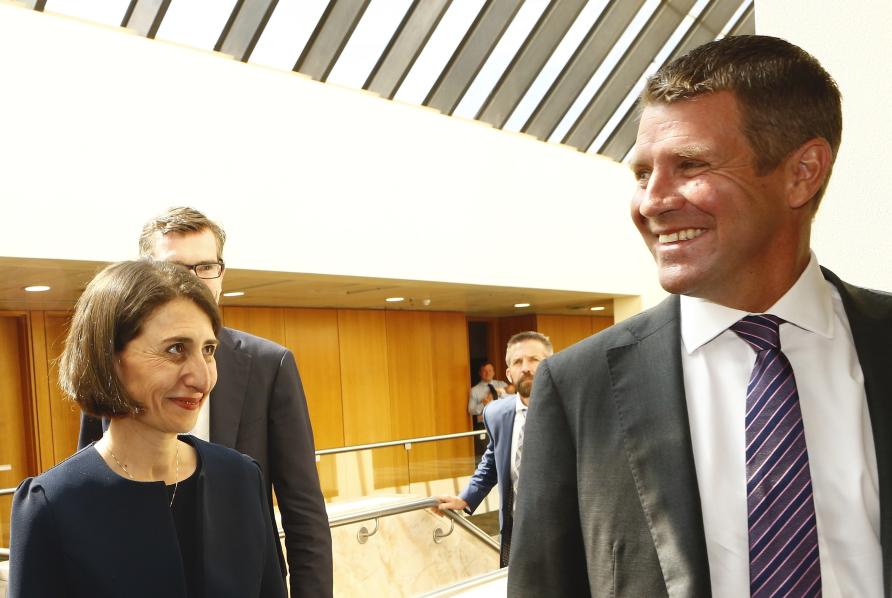
Mike Baird has supported moves by his successor as NSW Premier Gladys Berejiklian to wind back the lockout laws.
While O’Farrell initially brought in the laws, Baird continued them as Premier in the face of growing criticism that Sydney’s reputation and businesses were suffering – criticism that would ultimately hurt his popularity.
Today he stands by the laws for being effective in reducing violence and injuries — non-domestic assaults in the area fell by 52.8 per cent — but he also supports moves by his successor, Premier Gladys Berejiklian, to wind them back. He argues there was always going to be a time when it was right to put the onus back on industry and customers to better self-regulate.
“The statistics on fewer injuries (as a result of the laws) speak for themselves, but there were also unintended consequences and impacts on broader city perceptions, so you have to be open to change,” he says.
Baird, along with former prime minister Julia Gillard and former chief of the Australian Defence Force Air Field Marshal Sir Angus Houston, is part of a distinguished selection panel for the 2019 McKinnon Prize in Political Leadership, to be awarded in March. And for Baird, the type of political leadership the country needs most isn’t the leadership that gets someone elected, but the leadership that inspires and unites people around pursuing policy outcomes.
“That is the political leadership we need to see more of — leaders who are principled and values-driven to pursue the best possible public policy for their community, state and country.
“To be successful, leaders have to have a broad vision of what you want to achieve that can get people off the couch, get cabinet ministers out of their chairs. You can’t inspire a community, a council or a government unless you are setting a vision that is tangible and which people understand.”
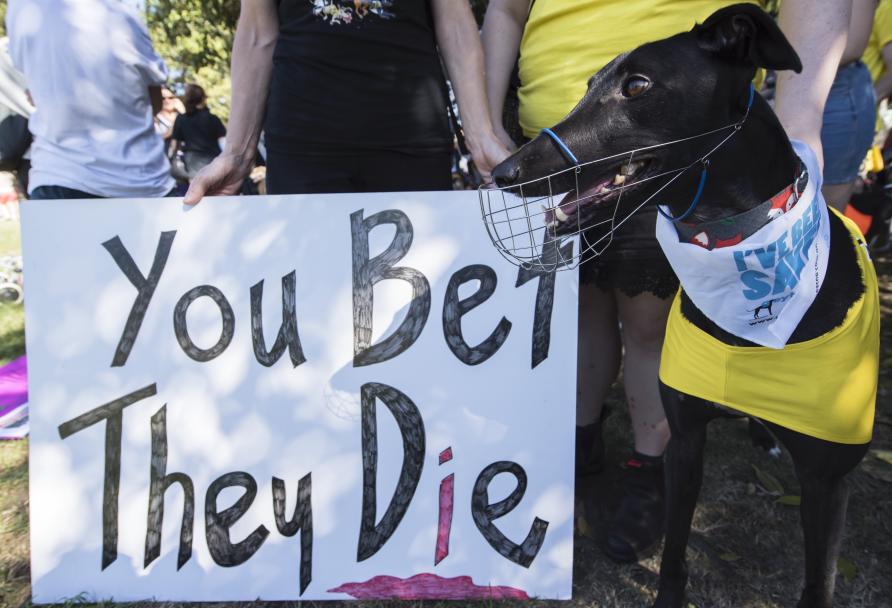
Mike Baird announced a state ban on greyhound racing, only to reverse his decision three months later following heavy and widespread criticism.
What frustrates him is the way politics too easily becomes focused on competing ideologies and wedge issues in which debates descend to two sides “screaming into angry buckets”.
It is a problem he says is getting worse, and political leaders need to be looking for opportunities to “reach across the aisle” and work together.
Baird’s support for taking in more Syrian refugees, he says, was a case in point in that put him at odds with many on his side of politics, including the tougher stance of then Prime Minister Tony Abbott. “To his credit Tony responded very graciously when I spoke to him about it,” remembers Baird.
“It is possible to have these debates in a way that rises above screaming buckets and the ideological expectations.
“In that debate there were genuine fears over who these refugees are and the impact they are going to have in terms of jobs and the broader economy and in terms of security, but at the same time we could see the desperation of these families. So what you do is reassure people and ensure everything is done to make sure we are as safe as possible.
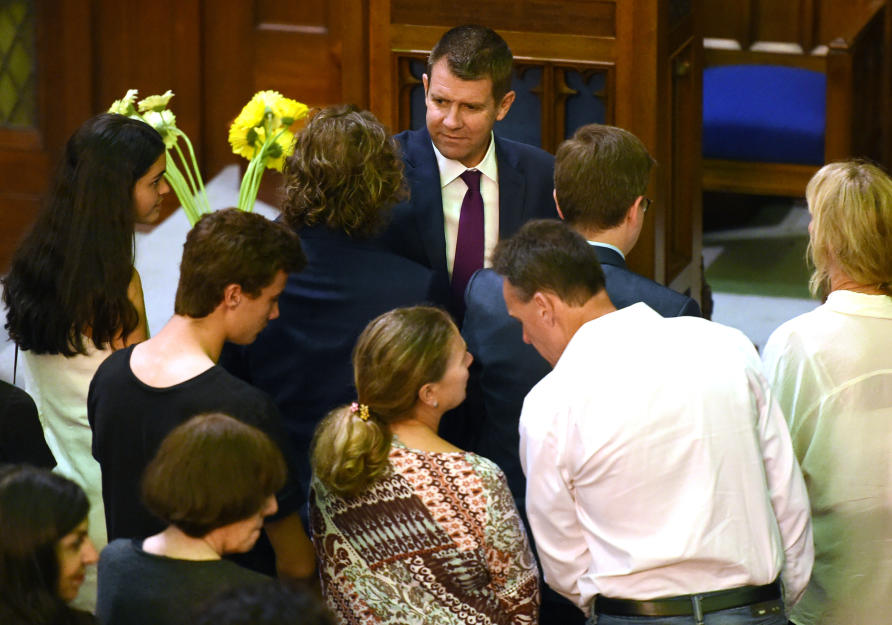
Mike Baird talks to Ken Johnson, the father of Tori Johnson, after a public service marking the two-year anniversary of the Lindt Cafe siege, at St Stephen’s Uniting Church in Sydney in 2016. Cafe manager Tori Johnson and customer Katrina Dawson were killed in the siege, along with the gunman.
“There are moments that matter when you need to stand up, and my encouragement to all leaders in a political debate is ‘just don’t stand in your own half’.
“If we just played the issue instead of each other we’d be a stronger country for it.”
One of those moments that mattered was December 2014 when a gunman espousing the cause of the terrorist Islamic State group took 18 people hostage in the Lindt Café in Sydney’s Martin Place.
Two hostages, Tori Johnson and Katrina Dawson, were killed along with the gunman. Premier Baird found himself having to lead a community that was both mourning and fearful.
“I’ll never be the same again. The loss of Tori and Katrina still haunts me,” says Baird. “But in the aftermath we were concerned whether this was going to be a tipping point, is there going to be anger and hate against the Muslim community, or can we somehow bring unity to this.”

Mr Baird gives a press conference in front of the thousands of floral tributes at Martin Place, scene of the Lindt Cafe siege.
In the event, community unity proved overwhelming. Martin Place was transformed into a bed of flowers and community leaders came together. It is this unity that Baird says political leaders need to tap into and foster.
“It showed there is something far greater and unifying than anyone’s ideological position, or their faith position, or cultural background.”
Baird had never wanted to go into politics. While it was in his blood — his father Bruce is a former NSW state infrastructure minister and served as a federal MP — he’d seen first-hand how consuming politics can be and had decided it wasn’t for him.
Instead, during the early part of his banking career he decided he wanted to make a real difference to people and communities by becoming an Anglican minister, travelling to Canada with his wife to attend a religious college. It was there that he wrote an appraisal of his life in which he concluded he would indeed become a minister, only for his lecturer to write across it — “or a career in Australian politics”. It was a revelatory moment.
When he first tried to win Liberal Party pre-selection in 1999 as a 31-year-old, he got “hammered”, but after going back to investment banking for a time, he successfully tried again in 2007 and went on to win the harbourside seat of Manly.
It was during that campaign, when he doorknocked thousands of homes, that he learned the importance of both being himself and listening.
“The first 200 to 300 doorknocks were awkward,” laughs Baird ruefully. “I mean, here I am, this young banker dude on their doorstep. But after that it was wonderful. Everyone I met had their own perspective and most were appreciative that you’d taken the effort to talk to them. It really helped me prepare for what was to come by understanding what the community was thinking in raw, unfiltered terms.
“I tried really hard to be as authentic as I could, and the only tool I had was to be fully present with whoever was in front of me talking to me. It didn’t matter what else may be going on, this was the person that mattered right now.
“Being who you are and what you stand for is critical because people may not always understand all the issues, and they will hear many things in the different arguments.
“But if at the centre is someone who they trust day in and day out, whose values show through … that can be very powerful in the public debate.”
The shortlisted names for the 2019 McKinnon Prize in Political Leadership will be released on February 4. The winners will be announced in March. This article was published by Pursuit.
Andrew Trounson is a senior journalist for the University of Melbourne’s Pursuit magazine. He was previously an education correspondent for The Australian.







